
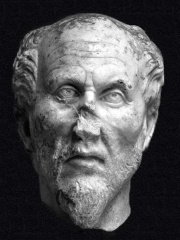
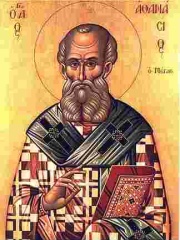
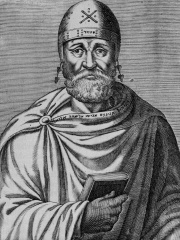
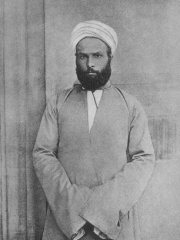



The Most Famous
PHILOSOPHERS from Egypt
This page contains a list of the greatest Egyptian Philosophers. The pantheon dataset contains 1,267 Philosophers, 22 of which were born in Egypt. This makes Egypt the birth place of the 13th most number of Philosophers behind Poland, and Russia.
Top 10
The following people are considered by Pantheon to be the top 10 most legendary Egyptian Philosophers of all time. This list of famous Egyptian Philosophers is sorted by HPI (Historical Popularity Index), a metric that aggregates information on a biography's online popularity. Visit the rankings page to view the entire list of Egyptian Philosophers.

1. Origen (185 - 254)
With an HPI of 84.46, Origen is the most famous Egyptian Philosopher. His biography has been translated into 68 different languages on wikipedia.
Origen of Alexandria (c. 185 – c. 253), also known as Origen Adamantius, was an early Christian scholar, ascetic, and theologian who was born and spent the first half of his career in Alexandria. He was a prolific writer who wrote roughly 2,000 treatises in multiple branches of theology, including textual criticism, biblical exegesis and hermeneutics, homiletics, and spirituality. He was one of the most influential and controversial figures in early Christian theology, apologetics, and asceticism. He has been described by John Anthony McGuckin as "the greatest genius the early church ever produced". Origen founded the Christian School of Caesarea, where he taught logic, cosmology, natural history, and theology, and became regarded by the churches of Palestine and Arabia as the ultimate authority on all matters of theology. He was tortured for his faith during the Decian persecution in 250 and died three to four years later from his injuries. Origen produced a massive quantity of writings because of the patronage of his close friend Ambrose of Alexandria, who provided him with a team of secretaries to copy his works, making him one of the most prolific writers in late antiquity. His treatise On the First Principles systematically laid out the principles of Christian theology and became the foundation for later theological writings. He also authored Contra Celsum, the most influential work of early Christian apologetics. Origen produced the Hexapla, the first critical edition of the Hebrew Bible, which contained the original Hebrew text, four different Greek translations, and a Greek transliteration of the Hebrew, all written in columns, side by side. He wrote hundreds of sermons covering almost the entire Bible, interpreting many passages as allegorical. Origen was the first to propose the ransom theory of atonement in its fully developed form, and he also significantly contributed to the development of the concept of the Trinity. Origen hoped that all people might eventually attain salvation but was always careful to maintain that this was only speculation. He defended free will and advocated Christian pacifism. Origen is considered by some Christian groups to be a Church Father. He is widely regarded as one of the most influential Christian theologians. His teachings were especially influential in the east, with Athanasius of Alexandria and the three Cappadocian Fathers being among his most devoted followers. Argument over the orthodoxy of Origen's teachings spawned the First Origenist Crisis in the late fourth century, in which he was attacked by Epiphanius of Salamis and Jerome but defended by Tyrannius Rufinus and John of Jerusalem. In 543, Emperor Justinian I condemned him as a heretic and ordered all his writings to be burned. The Second Council of Constantinople in 553 may have anathematized Origen, or it may have only condemned certain heretical teachings which claimed to be derived from Origen. The Church rejected his teachings on the pre-existence of souls.

2. Plotinus (203 - 270)
With an HPI of 82.09, Plotinus is the 2nd most famous Egyptian Philosopher. His biography has been translated into 77 different languages.
Plotinus (; Ancient Greek: Πλωτῖνος, Plōtînos; c. 204/5 – 270 CE) was a Greek Platonist philosopher, born and raised in Roman Egypt. Plotinus is regarded by modern scholarship as the founder of Neoplatonism. His teacher was the self-taught philosopher Ammonius Saccas, who belonged to the Platonic tradition. Historians of the 19th century invented the term "Neoplatonism" and applied it to refer to Plotinus and his philosophy, which was vastly influential during late antiquity, the Middle Ages, and the Renaissance. Much of the biographical information about Plotinus comes from Porphyry's preface to his edition of Plotinus' most notable literary work, The Enneads. In his metaphysical writings, Plotinus described three fundamental principles: the One, the Intellect, and the Soul. His works have inspired centuries of pagan, Jewish, Christian, Gnostic, and early Islamic metaphysicians and mystics, including developing precepts that influence mainstream theological concepts within religions, such as his work on duality of the One in two metaphysical states.

3. Athanasius of Alexandria (295 - 373)
With an HPI of 79.92, Athanasius of Alexandria is the 3rd most famous Egyptian Philosopher. His biography has been translated into 68 different languages.
Athanasius I of Alexandria (c. 296–298 – 2 May 373), also called Athanasius the Great, Athanasius the Confessor, or, among Coptic Christians, Athanasius the Apostolic, was a Christian theologian and the 20th patriarch of Alexandria (as Athanasius I). His intermittent episcopacy spanned 45 years (c. 8 June 328 – 2 May 373), of which over 17 encompassed five exiles, when he was replaced on the order of four different Roman emperors. Athanasius was a Church Father, the chief proponent of Trinitarianism against Arianism, and a noted Egyptian Christian leader of the fourth century. Conflict with Arius and Arianism, as well as with successive Roman emperors, shaped Athanasius' career. In 325, at age 27, Athanasius began his leading role against the Arians as a deacon and assistant to Bishop Alexander of Alexandria during the First Council of Nicaea. Roman Emperor Constantine the Great had convened the council in May–August 325 to address the Arian position that the Son of God, Jesus of Nazareth, is of a distinct substance from the Father. Three years after that council, Athanasius succeeded his mentor as Patriarch of Alexandria. In addition to the conflict with the Arians (including powerful and influential Arian churchmen led by Eusebius of Nicomedia), he struggled against the Emperors Constantine, Constantius II, Julian the Apostate and Valens. He was known as Athanasius Contra Mundum (Latin for 'Athanasius Against the World'). Nonetheless, within a few years of his death, Gregory of Nazianzus called him the "Pillar of the Church". His writings were well regarded by subsequent Church fathers in the West and the East, who noted their devotion to the Word-become-man, pastoral concern and interest in monasticism. Athanasius is considered one of the four great Eastern Doctors of the Church in the Catholic Church. Some argue that, in his Easter letter of 367, Athanasius was the first person to list the 27 books of the New Testament canon that are in use today. Others argue that Origen of Alexandria was the first to list the twenty-seven books of the New Testament in his Homilies on Joshua (only there is a textual variant as to whether or not he included Revelation). Athanasius is venerated as a saint in the Catholic Church, Eastern Orthodox Church, Oriental Orthodox Church, Church of the East, the Anglican Communion, and Lutheranism.

4. Philo (15 BC - 45)
With an HPI of 76.66, Philo is the 4th most famous Egyptian Philosopher. His biography has been translated into 57 different languages.
Philo of Alexandria (; Ancient Greek: Φίλων, romanized: Phílōn; Hebrew: יְדִידְיָה, romanized: Yəḏīḏyāh; c. 20 BCE – c. 50 CE), also called Philō Judæus, was a Hellenistic Jewish philosopher who lived in Alexandria, in the Roman province of Egypt. The only event in Philo's life that can be decisively dated is his representation of the Alexandrian Jews in a delegation to the Roman emperor Caligula in 40 CE following civil strife between the Jewish and Greek communities of Alexandria. Philo was a leading writer of the Hellenistic Jewish community in Alexandria, Egypt. He wrote expansively in Koine Greek on philosophy, politics, and religion in his time; specifically, he explored the connections between Greek Platonic philosophy and late Second Temple Judaism. For example, he maintained that the Greek-language Septuagint and the Jewish law still being developed by the rabbis of the period together serve as a blueprint for the pursuit of individual enlightenment. Philo's deployment of allegory to harmonize Jewish scripture, mainly the Torah, with Greek philosophy was the first documented of its kind, and thereby often misunderstood. Many critics of Philo assumed his allegorical perspective would lend credibility to the notion of legend over historicity. Philo often advocated a literal understanding of the Torah and the historicity of such described events, while at other times favoring allegorical readings.
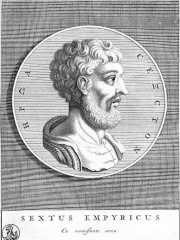
5. Sextus Empiricus (160 - 210)
With an HPI of 74.77, Sextus Empiricus is the 5th most famous Egyptian Philosopher. His biography has been translated into 46 different languages.
Sextus Empiricus (Ancient Greek: Σέξτος Ἐμπειρικός, Sextos Empeirikos; fl. mid-late 2nd century CE) was a Greek Pyrrhonist philosopher and Empiric school physician with Roman citizenship. His philosophical works are the most complete surviving account of ancient Greek and Roman Pyrrhonism, and because of the arguments they contain against the other Hellenistic philosophies, they are also a major source of information about those philosophies.

6. Muhammad Abduh (1849 - 1905)
With an HPI of 73.35, Muhammad Abduh is the 6th most famous Egyptian Philosopher. Her biography has been translated into 52 different languages.
Muḥammad ʿAbduh (also spelled Mohammed Abduh; Arabic: محمد عبده; 1849 – 11 July 1905) was an Egyptian Islamic scholar, judge, and Grand Mufti of Egypt. He was a central figure of the Arab Nahḍa and Islamic Modernism in the late 19th and early 20th centuries. He began teaching advanced students esoteric Islamic texts at Al-Azhar University while he was still studying there. From 1877, with the status of ʿālim, he taught logic, theology, ethics, and politics. He was also made a professor of history at Dar al-ʿUlūm the following year, and of Arabic language and literature at Madrasat al-Alsun. ʿAbduh was a champion of the press and wrote prolifically in Al-Manār and Al-Ahram. He was made editor of Al-Waqa'i' al-Misriyya in 1880. He also authored Risālat at-Tawḥīd (Arabic: رسالة التوحيد; "The Theology of Unity") and a commentary on the Quran. He briefly published the pan-Islamist anti-colonial newspaper al-ʿUrwa al-Wuthqā alongside his teacher and mentor Jamāl ad-Dīn al-Afghānī. ʿAbduh joined Freemasonry and subscribed to various Masonic lodges alongside his mentor al-Afghānī and his other pupils, but eventually left the secret society in his later years. He was appointed as a judge in the Courts of First Instance of the Native Tribunals in 1888, a consultative member of the Court of Appeal in 1899, and he was appointed Dar al-Ifta al-Misriyyah in 1899.

7. Ammonius Saccas (175 - 242)
With an HPI of 71.27, Ammonius Saccas is the 7th most famous Egyptian Philosopher. His biography has been translated into 42 different languages.
Ammonius Saccas (; Ancient Greek: Ἀμμώνιος Σακκᾶς; 175 AD – 243 AD) was a Hellenistic Platonist self-taught philosopher from Alexandria, generally regarded as the precursor of Neoplatonism or one of its founders. He is mainly known as the teacher of Plotinus, whom he taught from 232 to 243. He was undoubtedly the most significant influence on Plotinus in his development of Neoplatonism, although little is known about his own philosophical views. Later Christian writers stated that Ammonius was a Christian, but it is now generally assumed that there was a different Ammonius of Alexandria who wrote biblical texts.

8. John Philoponus (490 - 570)
With an HPI of 69.25, John Philoponus is the 8th most famous Egyptian Philosopher. His biography has been translated into 34 different languages.
John Philoponus (Greek: ; Ἰωάννης ὁ Φιλόπονος, Ioánnis o Philóponos; c. 490 – c. 570), also known as John the Grammarian or John of Alexandria, was a Coptic Miaphysite philologist, Aristotelian commentator and Christian theologian from Alexandria, Byzantine Egypt, who authored a number of philosophical treatises and theological works. John Philoponus broke from the Aristotelian–Neoplatonic tradition, questioning methodology and eventually leading to empiricism in the natural sciences. He was one of the first to propose a "theory of impetus" similar to the modern concept of inertia over Aristotelian dynamics. He is also the historical founder of what is now called the Kalam cosmological argument. Later in life Philoponus turned to Christian apologetics, arguing against the eternity of the world in his De opificio mundi, a theory which formed the basis of pagan attacks on the Christian doctrine of Creation. He also wrote on Christology, espousing a Miaphysite view. His by-name ὁ Φιλόπονος translates as "lover of toil", i.e. "diligent," referring to a miaphysite confraternity in Alexandria, the philoponoi, who were active in debating pagan (i.e. Neoplatonic) philosophers. His posthumous condemnation limited the spread of his writing, but copies of his work, Contra Aristotelem, resurfaced in medieval Europe, through translations from Arabic of his quotes included in the work of Simplicius of Cilicia, which was debated in length by Muslim philosophers such as al-Farabi, Avicenna, al-Ghazali and later Averroes, influencing Bonaventure and Buridan in Christian Western Europe, but also Rabbanite Jews such as Maimonides and Gersonides, who also used his arguments against their Karaite rivals. His work was largely debated in the Arabic scholarly tradition, where he is known as Yaḥyā al-Naḥwī (i.e. "John the Grammarian"), and his views against Aristotelian physics were defended by philosophers at the court of Fatimid Imam Al-Hakim bi-Amr Allah, particularly Hamid al-Din al-Kirmani, who debated Avicenna on the topic, and Hamza ibn Ali. His critique of Aristotle in the Physics commentary was a major influence on Giovanni Pico della Mirandola and Galileo Galilei, who cited Philoponus substantially in his works.

9. Saadia Gaon (882 - 942)
With an HPI of 68.42, Saadia Gaon is the 9th most famous Egyptian Philosopher. His biography has been translated into 34 different languages.
Saʿadia ben Yosef Gaon or Said bin Yusuf al-Fayyumi (892–942) was a prominent rabbi, gaon, Jewish philosopher, and exegete who was active in the Abbasid Caliphate. Saadia is the first important rabbinic figure to write extensively in Judeo-Arabic. Known for his works on Hebrew linguistics, Halakha, and Jewish philosophy, he was a student of the philosophical school known as "Jewish Kalam". In this capacity, his philosophical work entitled The Book of Beliefs and Opinions represents the first systematic attempt to integrate Jewish theology with components of ancient Greek philosophy. Saadia was also very active in opposition to Karaite Judaism in defense of Rabbinic Judaism.

10. Dhul-Nun al-Misri (796 - 859)
With an HPI of 67.23, Dhul-Nun al-Misri is the 10th most famous Egyptian Philosopher. His biography has been translated into 23 different languages.
Dhūl-Nūn al-Miṣrī (d. Giza, 859-862), often rendered in English literature as Zūl-Nūn al-Miṣrī, was an early Egyptian Sufi mystic and alchemist. His surname "al Misri" means "The Egyptian". He was born in Akhmim, Upper Egypt in 796 and is said to be of Nubian descent. Dhul-Nun is said to have made some study of the scholastic disciplines of alchemy, medicine, and Greek philosophy in his early life, before coming under the mentorship of the mystic Saʿdūn of Cairo, who is described in traditional accounts of Dhul-Nun's life as both "his teacher and spiritual director." Celebrated for his legendary wisdom both in his own life and by later Islamic thinkers, Dhul-Nun has been venerated as one of the greatest saints of the early era of Sufism.
People
Pantheon has 22 people classified as Egyptian philosophers born between 100 BC and 1946. Of these 22, 2 (9.09%) of them are still alive today. The most famous living Egyptian philosophers include Ahmad al-Tayyeb, and Leila Ahmed. The most famous deceased Egyptian philosophers include Origen, Plotinus, and Athanasius of Alexandria.
Living Egyptian Philosophers
Go to all RankingsDeceased Egyptian Philosophers
Go to all RankingsOrigen
185 - 254
HPI: 84.46
Plotinus
203 - 270
HPI: 82.09
Athanasius of Alexandria
295 - 373
HPI: 79.92
Philo
15 BC - 45
HPI: 76.66
Sextus Empiricus
160 - 210
HPI: 74.77
Muhammad Abduh
1849 - 1905
HPI: 73.35
Ammonius Saccas
175 - 242
HPI: 71.27
John Philoponus
490 - 570
HPI: 69.25
Saadia Gaon
882 - 942
HPI: 68.42
Dhul-Nun al-Misri
796 - 859
HPI: 67.23
Valentinus
100 - 160
HPI: 66.01
Ammonius Hermiae
440 - 523
HPI: 65.51





